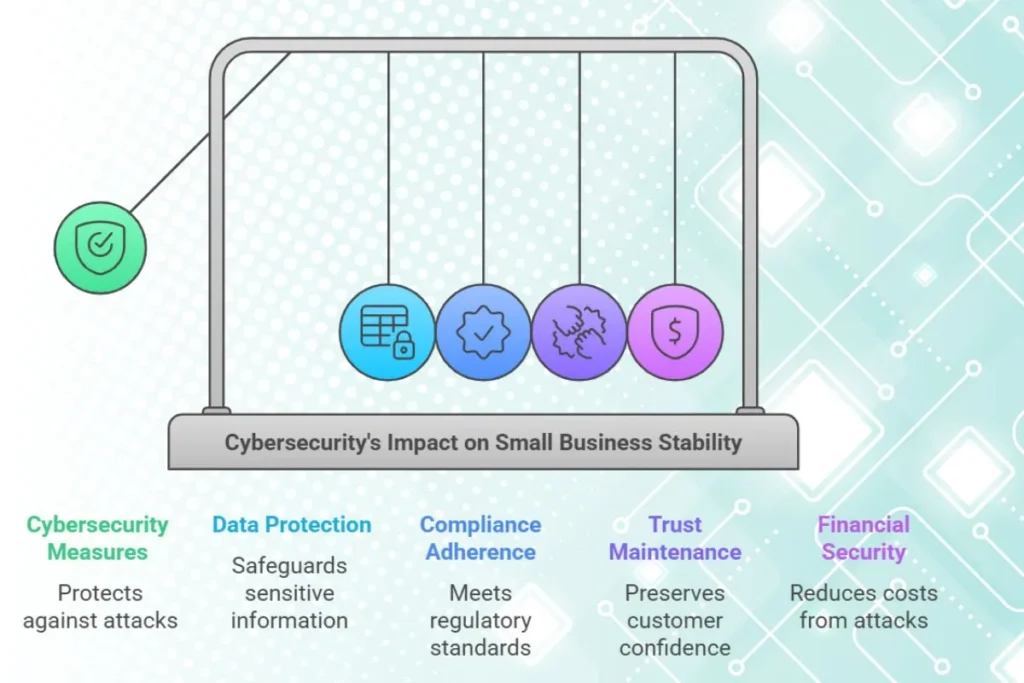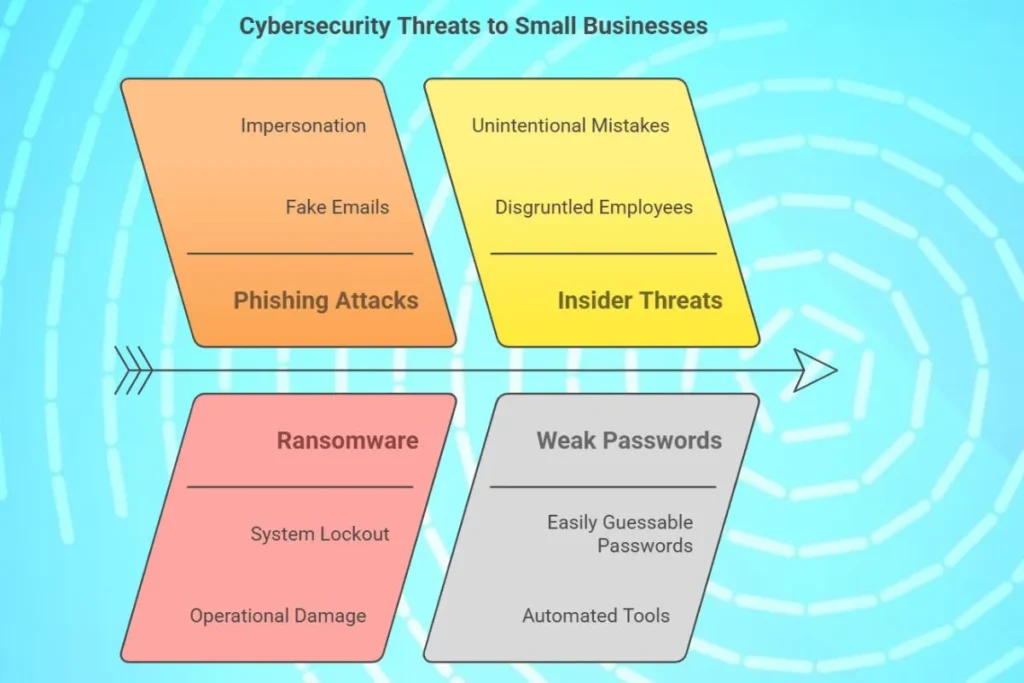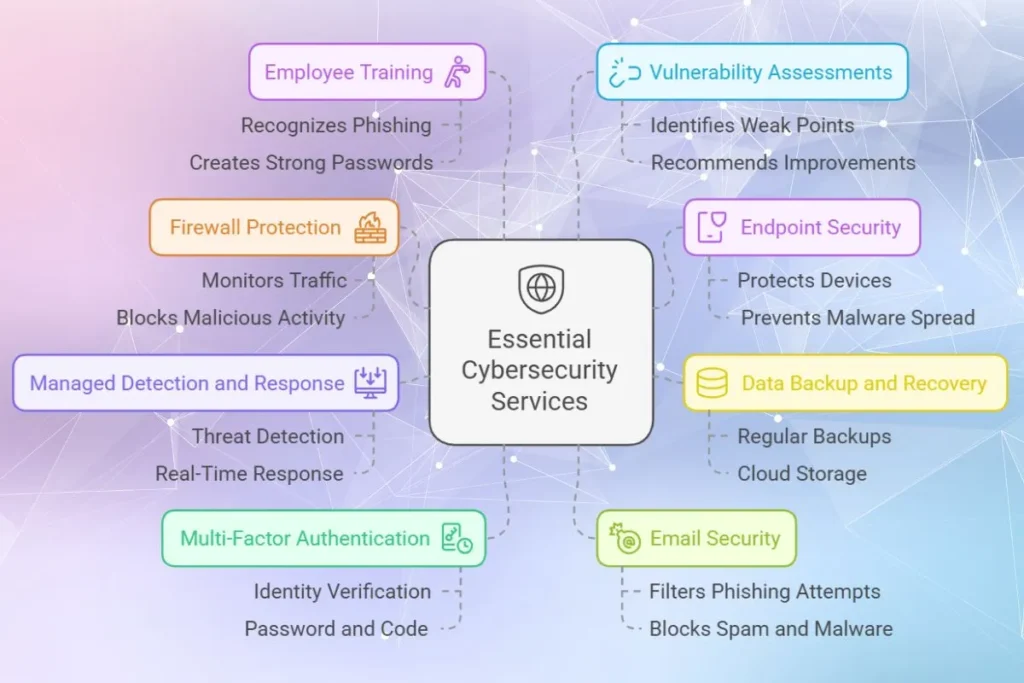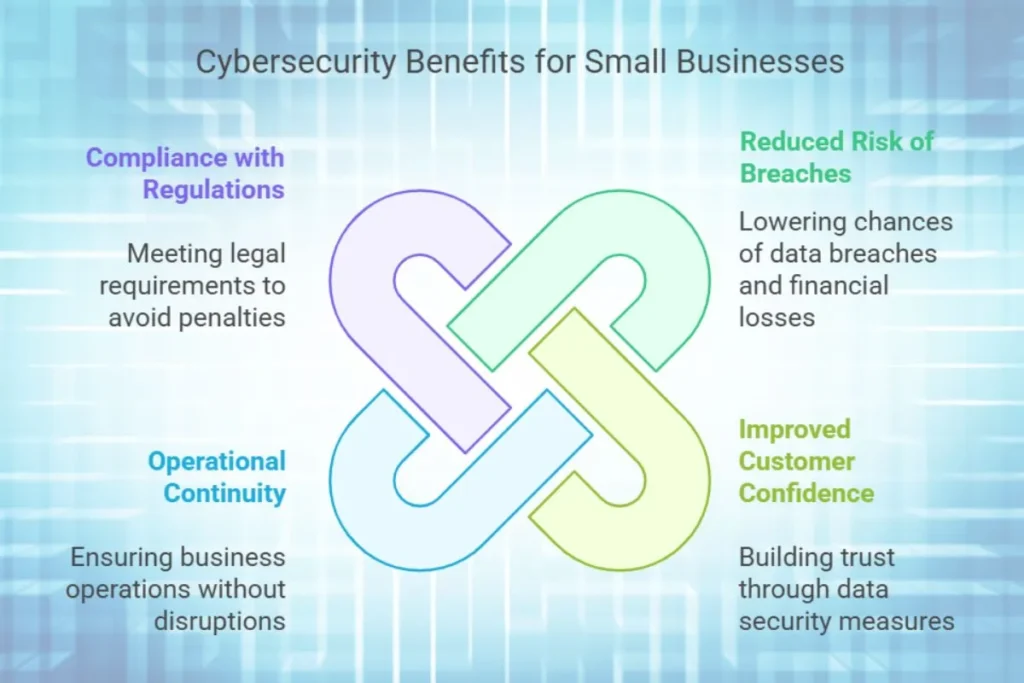Small businesses are important part of the global economy, yet they are increasingly targeted by cybercriminals. Many small businesses don’t have the resources that available for larger companies to defend against sophisticated cyberattacks. Cybersecurity services for small businesses are made to meet their needs to bridge this gap. This will ensure data protection, financial security and operational continuity to small businesses.
In this blog post, we shall explore the importance of cybersecurity for small businesses, the threats they face and the essential cybersecurity services they can adopt to protect their operations.
Why Cybersecurity Is Important for Small Businesses
1. Growing Threat
Small businesses are main targets for cyberattacks because they often have weaker security measures. Cybercriminals exploit vulnerabilities to access sensitive data or disrupt operations. For instance, a small retail business might experience ransomware attacks, where hackers encrypt their data and demand payment to release it. Similarly, phishing emails targeting small businesses can lead to significant breaches.
2. Compliance Requirements
Regulatory standards like GDPR, HIPAA, or PCI DSS apply to many small businesses. Non compliance can result in hefty fines and reputational damage. A small healthcare clinic, for instance, must protect patient data to meet HIPAA standards. Similarly, businesses handling online payments must adhere to PCI DSS guidelines to ensure customer financial information is secure.
3. Trust and Reputation
Customers trust businesses to safeguard their personal and financial information. A single data breach can erode this trust and harm a company’s reputation. Imagine a small e-commerce store losing customers because hackers leaked credit card details. The loss of trust often leads to long term financial losses along with loss of reputation.
4. Cost of a Cyberattack
The financial impact of a cyberattack can be devastating for a small business. Costs include data recovery, legal fees, lost revenue and potential fines. For instance, ransomware attacks can freeze critical operations, which causes downtime and loss of revenue until the issue is resolved. Without cybersecurity measures, businesses risk to lose significant assets.

Common Cybersecurity Threats for Small Businesses
1. Phishing Attacks
Phishing is a prevalent method where attackers trick employees into revealing sensitive information through fake emails or websites. For example, an attacker might impersonate a trusted vendor, requesting login credentials to compromise a small business’s systems. Phishing emails are often cleverly disguised, making them hard to detect.
2. Ransomware
Ransomware attacks lock businesses out of their systems until a ransom is paid. A local accounting firm might lose access to client records due to such an attack, crippling its operations. The financial and operational damage caused by ransomware often exceeds the ransom amount itself.
3. Insider Threats
Disgruntled employees or unintentional mistakes can lead to security breaches. For instance, an employee accidentally clicking on a malicious link could give hackers access to company systems. Insider threats are often overlooked but can have catastrophic consequences if not managed.
4. Weak Passwords
Using easily guessable passwords is a common issue. Cybercriminals use automated tools to crack weak passwords, gaining unauthorized access to systems and sensitive data. Weak password practices remain a significant vulnerability for many small businesses.
5. Outdated Software
Failure to update software can leave systems vulnerable to exploitation. Hackers exploit known flaws in outdated systems, such as unpatched point of sale software in small retail shops. Regular updates and patch management are important to stay secured.

Essential Cybersecurity Services for Small Businesses
1. Firewall Protection
Firewalls act as a barrier between a business’s internal network and external threats. They monitor and control incoming and outgoing traffic to block malicious activity. For example, a managed firewall service can protect a small marketing agency’s data while ensuring employees have secure access to resources. Modern firewalls also include intrusion prevention systems.
2. Endpoint Security
Endpoint security solutions protect devices like computers, smartphones and tablets from malware and unauthorized access. This is crucial for businesses with remote workers who may access sensitive data from personal devices. Comprehensive endpoint protection prevents threats from spreading across the network.
3. Data Backup and Recovery
Regular backups ensure businesses can recover data in case of a ransomware attack or hardware failure. Cloud based backup services provide secure storage and easy access to backed-up data. Automatic backups and encrypted storage solutions are ideal for small businesses.
4. Managed Detection and Response (MDR)
MDR services monitor a business’s network for threats and respond in real-time. For instance, a small consultancy firm using MDR can quickly detect unusual login attempts and prevent unauthorized access. These services provide peace of mind by handling threats proactively.
5. Multi-Factor Authentication (MFA)
MFA adds an extra layer of security by requiring users to verify their identity through multiple methods, such as a password and a one time code. This reduces the risk of unauthorized access to sensitive systems. MFA is especially useful for small businesses handling sensitive customer data.
6. Email Security
Email security services filter out phishing attempts and malicious attachments, protecting businesses from scams. A small law firm, for example, can use email security to prevent employees from falling victim to fraudulent emails. Secure email gateways also block spam and malware.
7. Employee Training
Employees are the first line of defense against cyberattacks. Training programs help staff recognize phishing attempts, create strong passwords and follow best practices for data protection. Simulated phishing campaigns are an effective way to measure and improve employee awareness.
8. Vulnerability Assessments
Regular vulnerability assessments identify weak points in a business’s systems. Treating these vulnerabilities proactively reduces the risk of breaches. For example, an IT provider can conduct assessments to ensure a small business’s network is secure and recommend necessary improvements.

Benefits of Cybersecurity Services for Small Businesses
1. Reduced Risk of Breaches
Comprehensive cybersecurity measures significantly lower the chances of data breaches. A small online retailer with robust security can protect customer information and avoid financial losses. Effective measures also reduce downtime caused by potential attacks.
2. Improved Customer Confidence
Customers are more likely to trust businesses that prioritize their data security. Displaying certifications or compliance badges reassures customers of a business’s commitment to protecting their information. Trust leads to loyalty and repeat business.
3. Operational Continuity
Cybersecurity services minimize downtime caused by cyberattacks, ensuring businesses can operate without disruptions. For instance, a backup and recovery plan enables a business to quickly resume operations after an attack. This is critical for maintaining customer satisfaction.
4. Compliance with Regulations
Meeting regulatory requirements protects businesses from legal penalties and enhances their credibility. A small accounting firm compliant with data protection laws can avoid fines and attract more clients. Regulatory compliance also reduces the risk of litigation.

Steps to Choose the Right Cybersecurity Services
- Assess Your Needs Identify the specific cybersecurity challenges your business faces. For instance, an e-commerce business may prioritize securing payment gateways, while a healthcare provider focuses on protecting patient records.
- Set a Budget Determine how much you can invest in cybersecurity. Many services offer scalable solutions, allowing businesses to start small and expand as needed.
- Consult Experts Engage with cybersecurity providers who specialize in small business solutions. They can recommend services tailored to your needs.
- Regularly Review Security Measures Cyber threats evolve constantly. Periodic reviews ensure your cybersecurity measures remain effective and up to date.
Conclusion
Cybersecurity services are essential for small businesses to protect their data, maintain customer trust and comply with regulations. By adopting suitable solutions like firewalls, endpoint security and employee training, small businesses can effectively combat cyber threats and ensure their operations run smoothly.
Investing in cybersecurity solutions will safeguard their assets and also drive their businesses for long-term success in this digital world.


Been coming back to this site often.